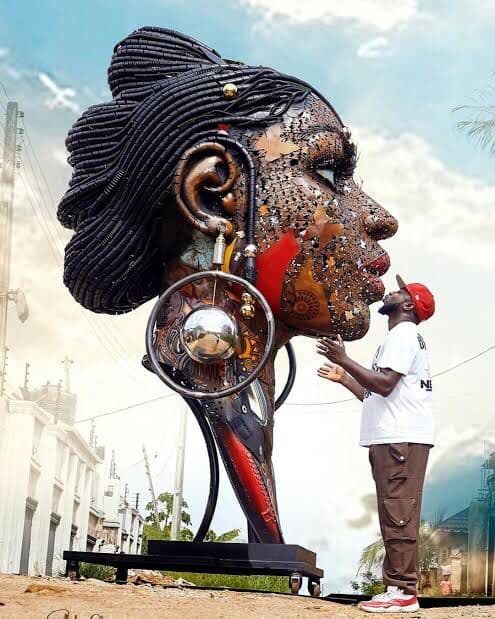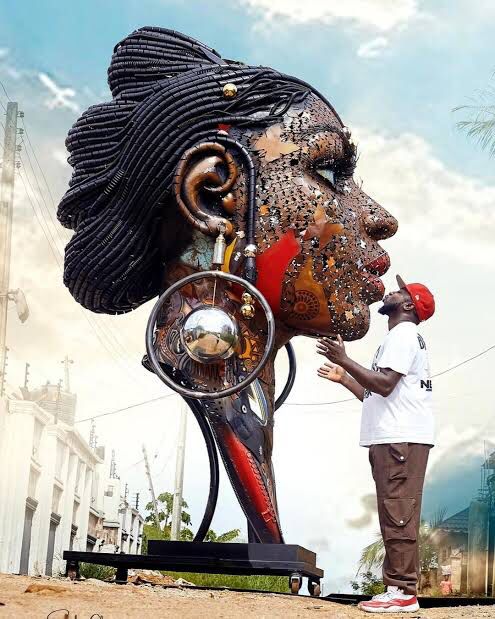Scrap to Spotlight: How one Artist is Forging Beauty from waste
EDITOR: Abigail Alfred


Dotun Popoola is a Nigerian-born sculptor who turns society’s trash
into visual magic. At just nine, he was scrapping milk tins and
toothpaste boxes; now he’s crafting monumental metal beasts that
tower over us and steal our breath. Raised in Lagos in 1981, he
polished his passion at Auchi Polytechnic and Obafemi Awolowo Uni.
After shining at Auchi Polytechnic with a top painting and general arts
diploma, Dotun went on to earn a bachelor’s and master’s in Fine and
Applied Arts from Obafemi Awolowo University. In 2015, he went global,
selling his car to study welding in South Dakota under the mentorship
at John Lopez’s studio. This fusion of formal art training with hands-on
metalwork birthed his signature “hybrid metal sculpting” style.
What makes Popoola epic isn’t just his skills, it’s his storytelling. He
welds scrap motorcycle tanks, bolts, pipes, and car parts into vibrant
lions, eagles, and human heads. The vibrancy pops through color,
because he hand-selects, sanitises and repaints each piece before
welding them into masterpieces. Each piece echoes environmental
decay and the resilience of Black identity.
My fave? “Irinkemi Asake,” a 12-foot-tall sculpted Black woman adorned
with 4,000 miniature metal butterflies, celebrating Black women’s
beauty and tenacity, now at Alabama’s Legacy Museum. His solo
shows, like the 13-piece Metala exhibition in Lagos, are visual feasts
pulling from Yoruba mythology and his family’s blacksmith lineage.
Pieces like Sango (the thunder god) and Eyo (Lagos masquerade) blend
cultural memory and metal magic.
His bio reads like a hustle manifesto: over 30 group shows, solo
exhibitions worldwide, including ART X Lagos, Qatar, Gujarat, Turkey,
Dubai Expo 2020, and even a seventh solo show at Baku ahead of
COP29, spotlighting climate change. More than a sculptor, he’s an
activist. He runs the Scrap Art Museum in Osun, mentoring hundreds
and training recyclers to upcycle metal and stabilize incomes.
His major exhibitions, like Reclaimed Beauty showcased at the Heydar
Aliyev Centre in Azerbaijan ahead of COP29, explicitly focus on
environmental awareness. Popoola uses his art as a platform to ignite
conversations around climate change and ecological care. Pieces like
Dafidi The Recycler even self-portrait the artist as a waste warrior,
celebrating the act of reclamation itself. Each sculpture isn’t just a
masterpiece, it’s proof that sustainability can be breathtaking. His
work proves environmentalism can be bold, colorful, and personal, and
that true impact doesn’t come from recycling alone, but from redefining
what resources are.
Popoola’s art isn’t just metal, it’s conversation. It tackles waste,
infrastructure decay, global warming, Black resilience, and gender pride,
all welded into forms bristling with texture, colour, and story. He’s been
featured in over 100 outlets—from NY Times to CNN, BBC, Reuters, Al
Jazeera—showing that scrap metal isn’t just refuse, it’s a canvas for
cultural reflection, environmental purpose, and raw creative power. His
impact isn’t confined to galleries. He’s an environmental and social
activist who fights infrastructural decay.
In a world drowning in waste, Dotun Popoola builds monuments. His
message? Trash is just unmade art. And with enough vision, sweat, and
weld, it can become treasure. From Lagos lanes to global fame, he
reminds us: beauty, meaning, and history can be forged, one weld at a
time.


